Martin Jacques了解中国的崛起 Understanding the Rise of China
- 格式:doc
- 大小:40.50 KB
- 文档页数:6
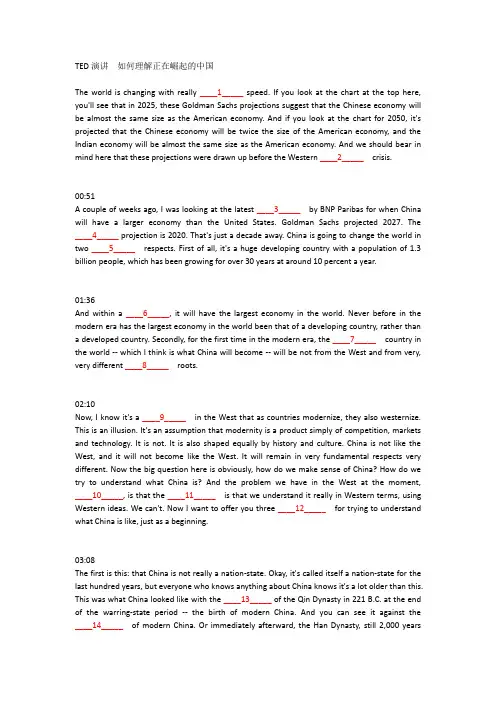
TED演讲如何理解正在崛起的中国The world is changing with really ____1_____speed. If you look at the chart at the top here, you'll see that in 2025, these Goldman Sachs projections suggest that the Chinese economy will be almost the same size as the American economy. And if you look at the chart for 2050, it's projected that the Chinese economy will be twice the size of the American economy, and the Indian economy will be almost the same size as the American economy. And we should bear in mind here that these projections were drawn up before the Western ____2_____crisis.00:51A couple of weeks ago, I was looking at the latest ____3_____ by BNP Paribas for when China will have a larger economy than the United States. Goldman Sachs projected 2027. The ____4_____ projection is 2020. That's just a decade away. China is going to change the world in two ____5_____respects. First of all, it's a huge developing country with a population of 1.3 billion people, which has been growing for over 30 years at around 10 percent a year.01:36And within a____6_____, it will have the largest economy in the world. Never before in the modern era has the largest economy in the world been that of a developing country, rather than a developed country. Secondly, for the first time in the modern era, the ____7_____country in the world -- which I think is what China will become -- will be not from the West and from very, very different ____8_____roots.02:10Now, I know it's a ____9_____in the West that as countries modernize, they also westernize. This is an illusion. It's an assumption that modernity is a product simply of competition, markets and technology. It is not. It is also shaped equally by history and culture. China is not like the West, and it will not become like the West. It will remain in very fundamental respects very different. Now the big question here is obviously, how do we make sense of China? How do we try to understand what China is? And the problem we have in the West at the moment, ____10_____, is that the ____11_____is that we understand it really in Western terms, using Western ideas. We can't. Now I want to offer you three ____12_____for trying to understand what China is like, just as a beginning.03:08The first is this: that China is not really a nation-state. Okay, it's called itself a nation-state for the last hundred years, but everyone who knows anything about China knows it's a lot older than this. This was what China looked like with the ____13_____ of the Qin Dynasty in 221 B.C. at the end of the warring-state period --the birth of modern China. And you can see it against the ____14_____of modern China. Or immediately afterward, the Han Dynasty, still 2,000 yearsago. And you can see already it ____15_____most of what we now know as Eastern China, which is where ____16_____ of Chinese lived then and live now.03:45Now what is ____17_____about this is, what gives China its sense of being China, what gives the Chinese the sense of what it is to be Chinese, comes not from the last hundred years, not from the nation-state period, which is what happened in the West, but from the period, if you like, of the civilization-state. I'm thinking here, for example, of customs like ____18_____, of a very distinctive notion of the state, likewise, a very ____19_____notion of the family, social relationships like guanxi, Confucian values and so on. These are all things that come from the period of the civilization-state. In other words, China, unlike the Western states and most countries in the world, is shaped by its sense of civilization, its existence as a civilization-state, rather than as a nation-state. And there's one other thing to add to this, and that is this: Of course we know China's big, huge, ____20_____and geographically, with a population of 1.3 billion people. What we often aren't really aware of is the fact that China is extremely diverse and very pluralistic, and in many ways very ____21_____. You can't run a place on this scale simply from Beijing, even though we think this to be the case. It's never been the case.05:10So this is China, a civilization-state, rather than a nation-state. And what does it mean? Well, I think it has all sorts of profound implications. I'll give you two quick ones. The first is that the most important political value for the Chinese is unity, is the ____22_____of Chinese civilization. You know, 2,000 years ago, Europe: ____23_____-- the fragmentation of the Holy Roman Empire. It divided, and it's remained ____24_____ever since. China, over the same time period, went in exactly the ____25_____direction, very painfully holding this huge civilization, civilization-state, together.。
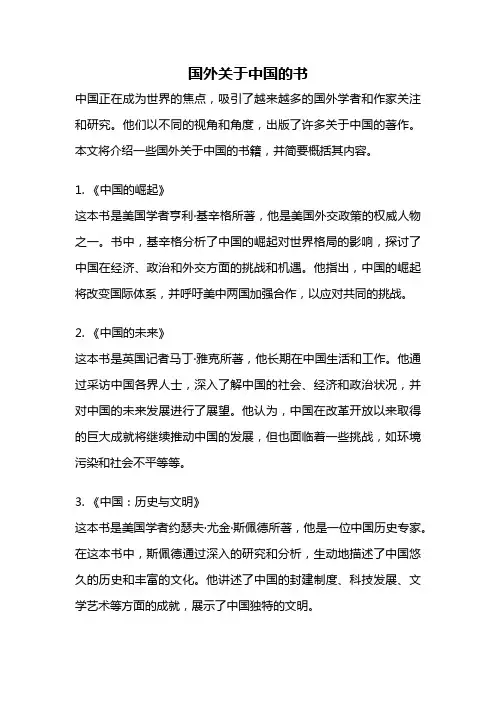
国外关于中国的书中国正在成为世界的焦点,吸引了越来越多的国外学者和作家关注和研究。
他们以不同的视角和角度,出版了许多关于中国的著作。
本文将介绍一些国外关于中国的书籍,并简要概括其内容。
1. 《中国的崛起》这本书是美国学者亨利·基辛格所著,他是美国外交政策的权威人物之一。
书中,基辛格分析了中国的崛起对世界格局的影响,探讨了中国在经济、政治和外交方面的挑战和机遇。
他指出,中国的崛起将改变国际体系,并呼吁美中两国加强合作,以应对共同的挑战。
2. 《中国的未来》这本书是英国记者马丁·雅克所著,他长期在中国生活和工作。
他通过采访中国各界人士,深入了解中国的社会、经济和政治状况,并对中国的未来发展进行了展望。
他认为,中国在改革开放以来取得的巨大成就将继续推动中国的发展,但也面临着一些挑战,如环境污染和社会不平等等。
3. 《中国:历史与文明》这本书是美国学者约瑟夫·尤金·斯佩德所著,他是一位中国历史专家。
在这本书中,斯佩德通过深入的研究和分析,生动地描述了中国悠久的历史和丰富的文化。
他讲述了中国的封建制度、科技发展、文学艺术等方面的成就,展示了中国独特的文明。
4. 《中国的环境挑战》这本书是加拿大学者伊丽莎白·库尔所著,她是环境问题的专家。
书中,库尔探讨了中国面临的环境挑战,如空气污染、水资源短缺等。
她分析了中国政府采取的环境保护措施,并提出了一些解决方案,希望能够帮助中国解决这些问题。
5. 《中国的女性》这本书是美国学者雪莉·尼科尔斯所著,她是性别研究的专家。
在这本书中,尼科尔斯深入研究了中国女性的地位和角色,并分析了中国妇女在经济、政治和社会领域的发展。
她认为,中国女性的地位在近年来有了显著提高,但仍然面临一些挑战,如职场性别歧视等。
以上只是一些国外关于中国的书籍,它们从不同的角度和领域探讨了中国的发展和挑战。
这些著作为我们更好地了解中国提供了宝贵的参考,也为中国与世界的交流和合作提供了重要的思考。
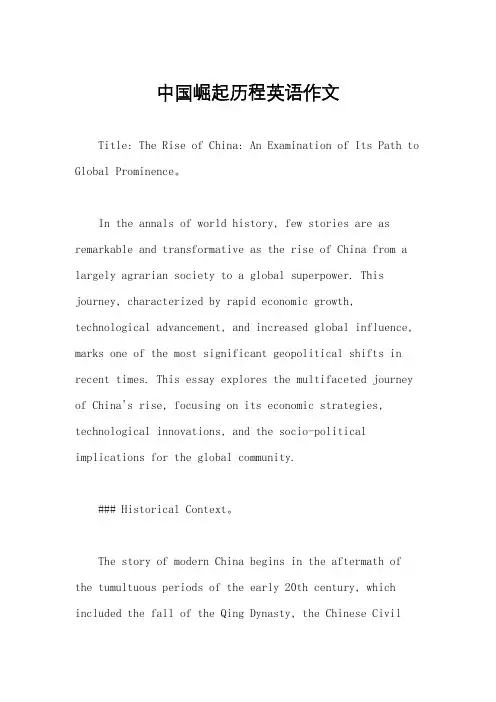
中国崛起历程英语作文Title: The Rise of China: An Examination of Its Path to Global Prominence。
In the annals of world history, few stories are as remarkable and transformative as the rise of China from a largely agrarian society to a global superpower. This journey, characterized by rapid economic growth, technological advancement, and increased global influence, marks one of the most significant geopolitical shifts in recent times. This essay explores the multifaceted journey of China's rise, focusing on its economic strategies, technological innovations, and the socio-political implications for the global community.### Historical Context。
The story of modern China begins in the aftermath of the tumultuous periods of the early 20th century, which included the fall of the Qing Dynasty, the Chinese CivilWar, and the founding of the People's Republic of China in 1949 under Mao Zedong. The initial decades under communist rule were marked by significant social and economic upheavals, including the Great Leap Forward and the Cultural Revolution, which, while aimed at strengthening and purifying the socialist cause, resulted in widespread famine and social strife.### Reform and Opening-Up。
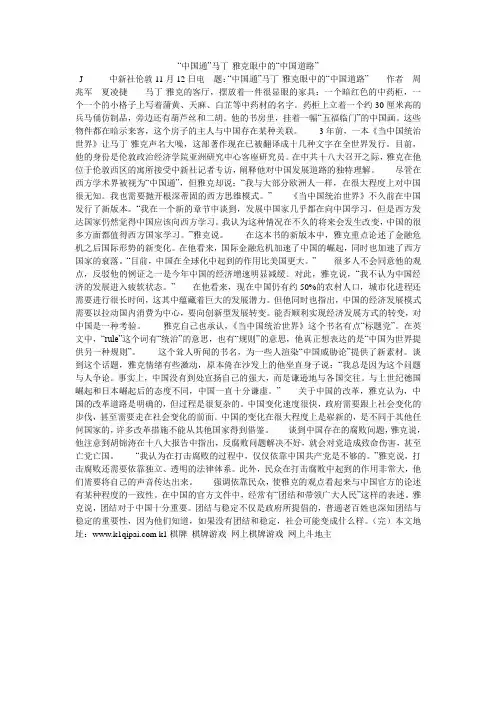
“中国通”马丁·雅克眼中的“中国道路”J 中新社伦敦11月12日电题:“中国通”马丁·雅克眼中的“中国道路”作者周兆军夏凌捷马丁·雅克的客厅,摆放着一件很显眼的家具:一个暗红色的中药柜,一个一个的小格子上写着蒲黄、天麻、白芷等中药材的名字。
药柜上立着一个约30厘米高的兵马俑仿制品,旁边还有葫芦丝和二胡。
他的书房里,挂着一幅“五福临门”的中国画。
这些物件都在暗示来客,这个房子的主人与中国存在某种关联。
3年前,一本《当中国统治世界》让马丁·雅克声名大噪,这部著作现在已被翻译成十几种文字在全世界发行。
目前,他的身份是伦敦政治经济学院亚洲研究中心客座研究员。
在中共十八大召开之际,雅克在他位于伦敦西区的寓所接受中新社记者专访,阐释他对中国发展道路的独特理解。
尽管在西方学术界被视为“中国通”,但雅克却说:“我与大部分欧洲人一样,在很大程度上对中国很无知。
我也需要抛开根深蒂固的西方思维模式。
”《当中国统治世界》不久前在中国发行了新版本。
“我在一个新的章节中谈到,发展中国家几乎都在向中国学习,但是西方发达国家仍然觉得中国应该向西方学习。
我认为这种情况在不久的将来会发生改变,中国的很多方面都值得西方国家学习。
”雅克说。
在这本书的新版本中,雅克重点论述了金融危机之后国际形势的新变化。
在他看来,国际金融危机加速了中国的崛起,同时也加速了西方国家的衰落。
“目前,中国在全球化中起到的作用比美国更大。
”很多人不会同意他的观点,反驳他的例证之一是今年中国的经济增速明显减缓。
对此,雅克说,“我不认为中国经济的发展进入疲软状态。
”在他看来,现在中国仍有约50%的农村人口,城市化进程还需要进行很长时间,这其中蕴藏着巨大的发展潜力。
但他同时也指出,中国的经济发展模式需要以拉动国内消费为中心,要向创新型发展转变。
能否顺利实现经济发展方式的转变,对中国是一种考验。
雅克自己也承认,《当中国统治世界》这个书名有点“标题党”。
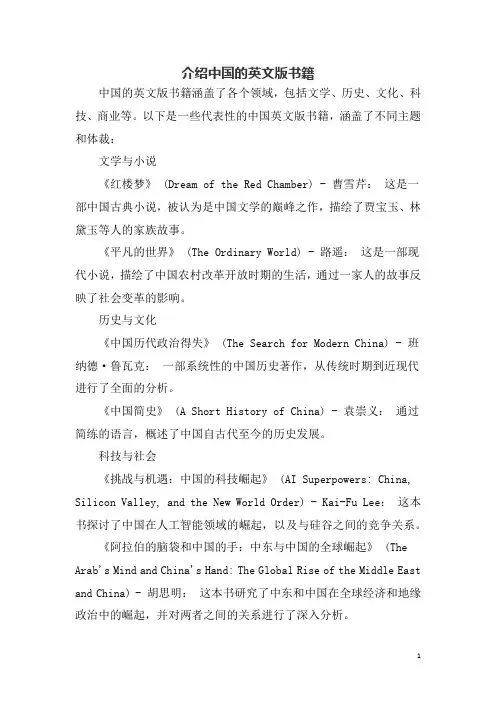
介绍中国的英文版书籍中国的英文版书籍涵盖了各个领域,包括文学、历史、文化、科技、商业等。
以下是一些代表性的中国英文版书籍,涵盖了不同主题和体裁:文学与小说《红楼梦》 (Dream of the Red Chamber) - 曹雪芹:这是一部中国古典小说,被认为是中国文学的巅峰之作,描绘了贾宝玉、林黛玉等人的家族故事。
《平凡的世界》 (The Ordinary World) - 路遥:这是一部现代小说,描绘了中国农村改革开放时期的生活,通过一家人的故事反映了社会变革的影响。
历史与文化《中国历代政治得失》 (The Search for Modern China) - 班纳德·鲁瓦克:一部系统性的中国历史著作,从传统时期到近现代进行了全面的分析。
《中国简史》 (A Short History of China) - 袁崇义:通过简练的语言,概述了中国自古代至今的历史发展。
科技与社会《挑战与机遇:中国的科技崛起》 (AI Superpowers: China, Silicon Valley, and the New World Order) - Kai-Fu Lee:这本书探讨了中国在人工智能领域的崛起,以及与硅谷之间的竞争关系。
《阿拉伯的脑袋和中国的手:中东与中国的全球崛起》 (The Arab's Mind and China's Hand: The Global Rise of the Middle East and China) - 胡思明:这本书研究了中东和中国在全球经济和地缘政治中的崛起,并对两者之间的关系进行了深入分析。
生活与社会《中国好妈妈,坏妈妈》 (China's Good, Bad, and Ugly Mothers) - 凯蒂·范·兰波尔:作者以自己在中国的亲身经历,深入探讨了中国母亲在当代社会中所面临的压力和挑战。
《老百姓的中国梦》 (The Chinese Dream: The Rise of the World's Largest Middle Class and What It Means to You) - 黄瑜、汪洋:这本书研究了中国庞大的中产阶级的崛起,以及其对全球经济和消费的影响。
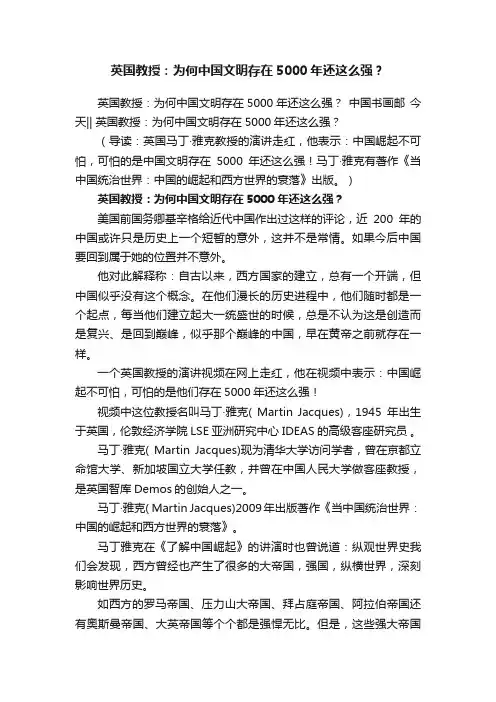
英国教授:为何中国文明存在5000年还这么强?英国教授:为何中国文明存在5000年还这么强?中国书画邮今天|| 英国教授:为何中国文明存在5000年还这么强?(导读:英国马丁·雅克教授的演讲走红,他表示:中国崛起不可怕,可怕的是中国文明存在5000年还这么强!马丁·雅克有著作《当中国统治世界:中国的崛起和西方世界的衰落》出版。
)英国教授:为何中国文明存在5000年还这么强?美国前国务卿基辛格给近代中国作出过这样的评论,近200年的中国或许只是历史上一个短暂的意外,这并不是常情。
如果今后中国要回到属于她的位置并不意外。
他对此解释称:自古以来,西方国家的建立,总有一个开端,但中国似乎没有这个概念。
在他们漫长的历史进程中,他们随时都是一个起点,每当他们建立起大一统盛世的时候,总是不认为这是创造而是复兴、是回到巅峰,似乎那个巅峰的中国,早在黄帝之前就存在一样。
一个英国教授的演讲视频在网上走红,他在视频中表示:中国崛起不可怕,可怕的是他们存在5000年还这么强!视频中这位教授名叫马丁·雅克( Martin Jacques),1945年出生于英国,伦敦经济学院LSE亚洲研究中心IDEAS的高级客座研究员。
马丁·雅克( Martin Jacques)现为清华大学访问学者,曾在京都立命馆大学、新加坡国立大学任教,并曾在中国人民大学做客座教授,是英国智库Demos的创始人之一。
马丁·雅克( Martin Jacques)2009年出版著作《当中国统治世界:中国的崛起和西方世界的衰落》。
马丁雅克在《了解中国崛起》的讲演时也曾说道:纵观世界史我们会发现,西方曾经也产生了很多的大帝国,强国,纵横世界,深刻影响世界历史。
如西方的罗马帝国、压力山大帝国、拜占庭帝国、阿拉伯帝国还有奥斯曼帝国、大英帝国等个个都是强悍无比。
但是,这些强大帝国在衰弱后基本上都是飞灰湮灭后世很难再崛起了。
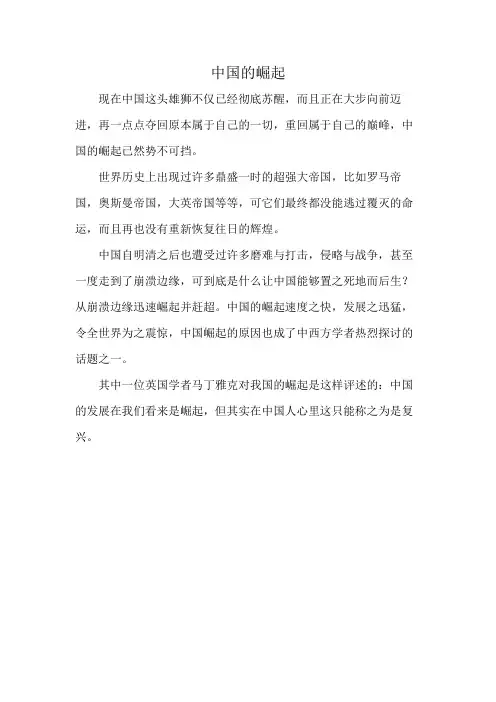
中国的崛起
现在中国这头雄狮不仅已经彻底苏醒,而且正在大步向前迈进,再一点点夺回原本属于自己的一切,重回属于自己的巅峰,中国的崛起已然势不可挡。
世界历史上出现过许多鼎盛一时的超强大帝国,比如罗马帝国,奥斯曼帝国,大英帝国等等,可它们最终都没能逃过覆灭的命运,而且再也没有重新恢复往日的辉煌。
中国自明清之后也遭受过许多磨难与打击,侵略与战争,甚至一度走到了崩溃边缘,可到底是什么让中国能够置之死地而后生?从崩溃边缘迅速崛起并赶超。
中国的崛起速度之快,发展之迅猛,令全世界为之震惊,中国崛起的原因也成了中西方学者热烈探讨的话题之一。
其中一位英国学者马丁雅克对我国的崛起是这样评述的:中国的发展在我们看来是崛起,但其实在中国人心里这只能称之为是复兴。
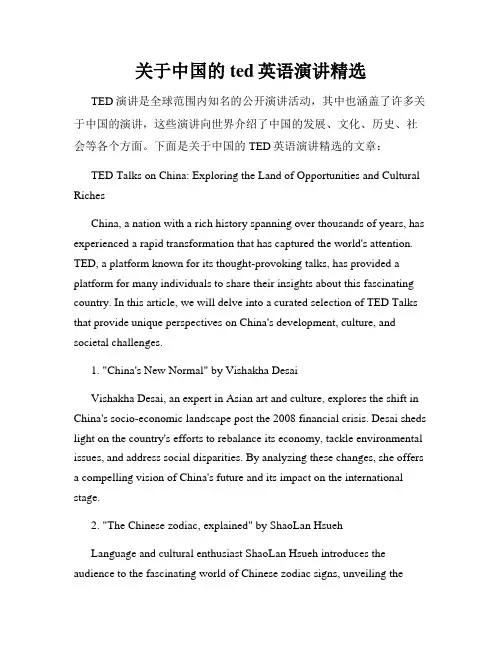
关于中国的ted英语演讲精选TED演讲是全球范围内知名的公开演讲活动,其中也涵盖了许多关于中国的演讲,这些演讲向世界介绍了中国的发展、文化、历史、社会等各个方面。
下面是关于中国的TED英语演讲精选的文章:TED Talks on China: Exploring the Land of Opportunities and Cultural RichesChina, a nation with a rich history spanning over thousands of years, has experienced a rapid transformation that has captured the world's attention. TED, a platform known for its thought-provoking talks, has provided a platform for many individuals to share their insights about this fascinating country. In this article, we will delve into a curated selection of TED Talks that provide unique perspectives on China's development, culture, and societal challenges.1. "China's New Normal" by Vishakha DesaiVishakha Desai, an expert in Asian art and culture, explores the shift in China's socio-economic landscape post the 2008 financial crisis. Desai sheds light on the country's efforts to rebalance its economy, tackle environmental issues, and address social disparities. By analyzing these changes, she offers a compelling vision of China's future and its impact on the international stage.2. "The Chinese zodiac, explained" by ShaoLan HsuehLanguage and cultural enthusiast ShaoLan Hsueh introduces the audience to the fascinating world of Chinese zodiac signs, unveiling thesymbolism and historical significance behind each animal representation. Through her witty and engaging talk, Hsueh provides insights into how understanding the Chinese zodiac can deepen our appreciation for Chinese culture and enhance cross-cultural communication.3. "What Does It Mean to Be Both Chinese and American?" by Sue BryceWith a personal journey as the backdrop, Sue Bryce narrates her experiences growing up as a Chinese American and the challenges she faced in reconciling her dual identity. Her talk touches upon the complexities of cultural assimilation, the significance of heritage, and the importance of embracing diversity. Bryce's story sheds light on the unique perspectives of individuals grappling with their cultural roots in a globalized world.4. "The Rise of China and Its Global Impact" by Martin JacquesMartin Jacques, a renowned author and academic, delves into the multifaceted rise of China and its implications for the global order. By examining China's historical trajectory, cultural values, and growing influence, Jacques offers a fresh perspective on the country's ascent. His talk prompts reflection on China's place in the world and the challenges it presents to traditional Western hegemony.5. "China's Left-Behind Children" by Joanna ChiuJournalist Joanna Chiu sheds light on the struggles faced by China's left-behind children – those who are left in rural areas while their parents seek better economic opportunities in cities. Through compelling stories and statistics, Chiu highlights the emotional, societal, and educational challengesfaced by these children. Her talk urges for greater attention to be paid to this significant issue and offers potential solutions.6. "The Power of the Chinese Internet" by Eric X. LiEric X. Li, a political scientist, explores the dynamic landscape of China's internet and its impact on the country's political and social sphere. Li argues that China's unique approach to internet governance challenges Western notions of freedom and democracy and offers an alternative narrative. His talk invites the audience to reevaluate their preconceived notions about the internet and understand its role in shaping societies.China's TED Talks offer a window into the country's diverse and evolving landscape. Through these talks, we gain deeper insights into China's economic reforms, cultural heritage, identity struggles, global influence, societal issues, and technological advancements. The speakers' perspectives challenge our assumptions and broaden our understanding of this multifaceted nation. As China continues to shape global affairs, these TED Talks provide a valuable resource for anyone seeking a nuanced understanding of this complex and fascinating country.。
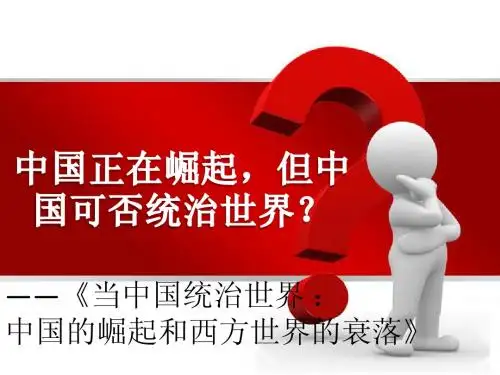
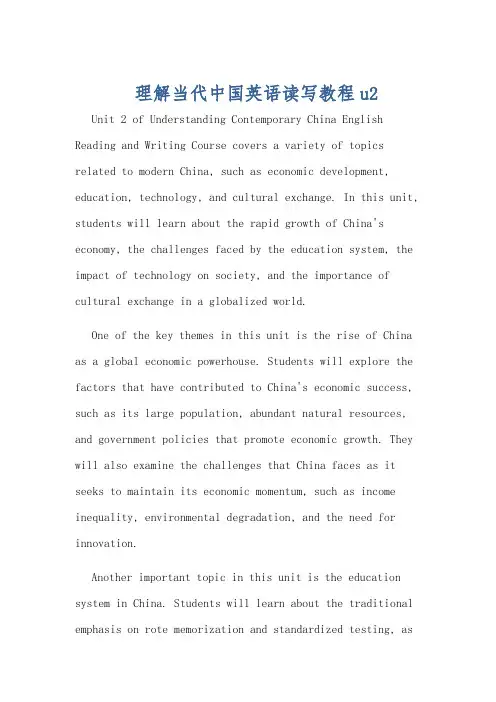
理解当代中国英语读写教程u2 Unit 2 of Understanding Contemporary China English Reading and Writing Course covers a variety of topics related to modern China, such as economic development, education, technology, and cultural exchange. In this unit, students will learn about the rapid growth of China's economy, the challenges faced by the education system, the impact of technology on society, and the importance of cultural exchange in a globalized world.One of the key themes in this unit is the rise of China as a global economic powerhouse. Students will explore the factors that have contributed to China's economic success, such as its large population, abundant natural resources, and government policies that promote economic growth. They will also examine the challenges that China faces as it seeks to maintain its economic momentum, such as income inequality, environmental degradation, and the need for innovation.Another important topic in this unit is the education system in China. Students will learn about the traditional emphasis on rote memorization and standardized testing, aswell as efforts to reform the system to foster creativity, critical thinking, and problem-solving skills. They will also explore the role of education in promoting social mobility and economic development in China.Technology is another key focus of Unit 2. Students will examine the impact of technology on various aspects of Chinese society, such as communication, transportation, healthcare, and entertainment. They will also consider the ethical and social implications of technological advancements, such as privacy concerns, job displacement, and digital divide.Cultural exchange is also an important theme in this unit. Students will learn about the rich cultural heritage of China, including its history, language, art, and traditions. They will also explore the ways in which China is engaging with the global community through cultural exchange programs, international partnerships, and participation in global events such as the Olympics and World Expos.Overall, Unit 2 of Understanding Contemporary China English Reading and Writing Course provides students with acomprehensive overview of the key issues and trends shaping modern China. By studying these topics, students will gaina deeper understanding of China's place in the world andthe opportunities and challenges it faces as a rapidly developing nation.当代中国英语读写教程第二单元涵盖了与现代中国相关的各种主题,如经济发展、教育、技术和文化交流。
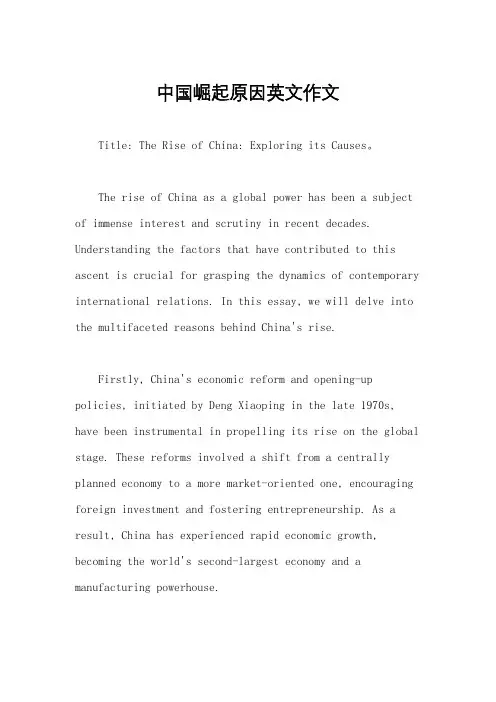
中国崛起原因英文作文Title: The Rise of China: Exploring its Causes。
The rise of China as a global power has been a subject of immense interest and scrutiny in recent decades. Understanding the factors that have contributed to this ascent is crucial for grasping the dynamics of contemporary international relations. In this essay, we will delve into the multifaceted reasons behind China's rise.Firstly, China's economic reform and opening-up policies, initiated by Deng Xiaoping in the late 1970s, have been instrumental in propelling its rise on the global stage. These reforms involved a shift from a centrally planned economy to a more market-oriented one, encouraging foreign investment and fostering entrepreneurship. As a result, China has experienced rapid economic growth, becoming the world's second-largest economy and a manufacturing powerhouse.Moreover, China's vast population has served as both a challenge and an advantage. With over a billion people, China boasts a massive labor force, providing a competitive edge in labor-intensive industries. This demographic dividend has fueled economic expansion and enabled China to leverage economies of scale in production.Additionally, China's strategic focus on infrastructure development has played a pivotal role in its rise. The country has invested heavily in building modern transportation networks, telecommunications systems, and energy infrastructure. These investments have enhanced connectivity, facilitated trade, and bolstered economic efficiency, laying the groundwork for sustained growth.Furthermore, China's pragmatic approach to foreign policy has facilitated its ascent on the global stage. By pursuing a policy of peaceful coexistence and non-interference in the internal affairs of other countries, China has cultivated diplomatic relationships worldwide.Its participation in international organizations and initiatives has enabled it to exert influence and shapeglobal governance structures.China's emphasis on education and human capital development has also contributed to its rise. The country has made significant investments in education, research, and development, fostering innovation and technological advancement. China's focus on STEM (science, technology, engineering, and mathematics) fields has propelled it to the forefront of cutting-edge industries such as artificial intelligence, renewable energy, and biotechnology.Furthermore, China's geopolitical ambitions and quest for regional hegemony have driven its rise as a military power. The modernization of the People's Liberation Army (PLA) and the expansion of its naval capabilities reflect China's aspirations for greater influence in the Asia-Pacific region and beyond. However, it's essential to note that China often emphasizes its military modernization as defensive in nature, aiming to safeguard its territorial integrity and national sovereignty.Additionally, globalization has provided China withunprecedented opportunities for growth and integration into the global economy. The country has embraced trade liberalization and international economic cooperation, becoming a key player in global supply chains and trade networks. China's accession to the World Trade Organization (WTO) in 2001 marked a significant milestone in its economic integration with the world.In conclusion, the rise of China as a global power is the result of a complex interplay of economic, demographic, strategic, diplomatic, and socio-cultural factors. From its economic reforms and infrastructure development to its emphasis on education and technological innovation, China has pursued a multifaceted strategy to achieve its ascent on the world stage. However, as China continues to assert its influence and power, it also faces a myriad of challenges and uncertainties on its path to global leadership.。
与中国有关的外国书近年来,中国日益成为全球关注的焦点,这一点在外国学者所撰写的与中国相关的书籍中得以体现。
他们以各自的视角和研究领域,探讨了中国的历史、政治、经济、文化以及中国与世界的关系等诸多方面。
以下是一些与中国有关的外国书籍的相关内容:《中国:历史与文化》(China: A History)是由英国学者约翰·费尔南德斯-阿米亚迪斯(John Keay)所撰写的一本畅销书。
该书以通俗易懂的语言,讲述了中国悠久的历史以及深厚的文化底蕴。
费尔南德斯-阿米亚迪斯通过对中国各个时期的重大事件、思想家和文化现象的解读,使读者对中国的历史和文化能够有更深入的了解。
《中国:二十一世纪的帝国》(China: Empire of Living Symbols)是美国学者李怡(Jonathan Fenby)所著,探讨了中国当前的政治、经济和社会现象。
李怡剖析了中国改革开放以来的巨大变革,以及中国在全球舞台上的崛起。
他从历史和现实的角度,对中国的政治体制、经济发展以及社会问题进行了深入的研究和描述。
《中国制造:全球制造业中的革命》(The China Price: The True Cost of Chinese Competitive)是由美国记者亨利·彼得斯(Alexandra Harney)所著。
该书讲述了中国作为全球制造业巨人的崛起和影响。
亨利·彼得斯通过采访和调查,揭示了中国低成本制造业的工作条件、环境影响以及对全球经济格局的影响。
《中国能否崛起?》(Can China Rise?)是由美国学者杰弗里·贡韦厄(Jonathan P. Doh)和埃劳·戴维斯(Kevin F. Corley)合著的一本书。
他们分析了中国在全球舞台上取得的巨大成就,并提出了一系列问题,探讨中国是否能够持续崛起。
通过对中国经济、政治和文化的深入研究,以及对中国领导人和政策的关注,作者提供了对中国未来发展的全面分析。
龙源期刊网 http://www.qikan.com.cn 西方视野中的大国雄心 作者:赵隽杨 来源:《21世纪商业评论》2017年第11期
马丁.雅克 (Martin Jacques)出生于英国考文垂,他出生的1945年,英国拥有世界上五分之一的土地和人口,至他成年时,大多数英属殖民地已独立,日不落英国的辉煌不再,马丁.雅克评论说,“我的一生都被英国的衰落塑造。”
在曼切斯特大学完成本科学业后,马丁.雅克去剑桥大学攻读博士学位,后担任《卫报》和《泰晤士报》的专栏作家,除在剑桥任职外,他兼任伦敦政治经济学院IDEAS的高级客座研究员。
马丁.雅克长期关注中国研究,曾在香港居住过两年半,作为访问学者身份到访中国人民大学等高校,并与中国高层有过直接对话。
2008年,一场金融危机席卷全球,世界上主要经济体由此陷入衰退,只有中国是一个例外,经济依然保持着6.5%以上的增长,迅速跻身成为全球第二大经济体。机敏的西方学者发现,中国崛起将不只限于经济影响,还将从制度理念、地缘政治、社会文化等方面,推动世界格局的洗牌,而马丁.雅克是其中颇具代表性的一员,且格外坚定地看好中国。
他的视角不限于国际力量的格局,他非常强调中国的内在独特性,认为中国不同于西方的民族国家,而更是一个“文明国家”,其施加影响的方式可以更为谦逊和包容,将使国际社会更加多元民主,有助于实现多极化、西方和东方会不断交流和融合,同时提供一种新的发展模式。
《大国雄心》的出版,引起了西方知识界的关注,其大胆的预测也正开始得到验证,中国国家领导人曾在公开演讲中谈及他的著作。《21CBR》专访了马丁.雅克,他阐释了一个西方学者视野下中国的独特性及全球影响,并谈论了其对中国领导人和治国方式的认知,当然,其认知也未必是全面或者准确的。
独特的文明国家 21世纪:您认为中国自古以来是文明国家,区别于民族国家,这会给今天的中国带来哪些影响?
The world is changing with really remarkable speed. If you look at the chart at the top here, you'll see that in 2025, these Goldman Sachs projections suggest that the Chinese economy will be almost the same size as the American economy. And if you look at the chart for 2050, it's projected that the Chinese economy will be twice the size of the American economy, and the Indian economy will be almost the same size as the American economy. And we should bear in mind here that these projections were drawn up before the Western financial crisis.A couple of weeks ago, I was looking at the latest projection by BNP Paribas for when China will have a larger economy than the United States. Goldman Sachs projected 2027. The post-crisis projection is 2020. That's just a decade away. China is going to change the world in two fundamental respects. First of all, it's a huge developing country with a population of 1.3 billion people, which has been growing for over 30 years at around 10 percent a year.And within a decade, it will have the largest economy in the world. Never before in the modern era has the largest economy in the world been that of a developing country, rather than a developed country. Secondly, for the first time in the modern era, the dominant country in the world -- which I think is what China will become -- will be not from the West and from very, very different civilizational roots.Now I know it's a widespread assumption in the West that, as countries modernize, they also Westernize. This is an illusion. It's an assumption that modernity is a product simply of competition, markets and technology. It is not; it is also shaped equally by history and culture. China is not like the West, and it will not become like the West. It will remain in very fundamental respects very different. Now the big question here is obviously, how do we make sense of China? How do we try to understand what China is? And the problem we have in the West at the momentby-and-large is that the conventional approach is that we understand it really in Western terms, using Western ideas. We can't. Now I want to offer you three building blocks for trying to understand what China is like -- just as a beginning.The first is this, that China is not really a nation state. Okay, it's called itself a nation state for the last hundred years. But everyone who knows anything about China knows it's a lot older than this. This was what China looked like with the victory of the Qin Dynasty in 221 B.C. at the end of the warring state period -- the birth of modern China. And you can see it against the boundaries of modern China. Or immediately afterward, the Han Dynasty, still 2,000 years ago. And you can see already it occupies most of what we now know as Eastern China, which is where the vast majority of Chinese lived then and live now.Now what is extraordinary about this is, what gives China it's sense of being China, what gives the Chinese the sense of what it is to be Chinese, comes not from the last hundred years, not from the nation state period, which is what happened in the West, but from the period, if you like, of the civilization state. I'm thinkinghere, for example, of customs like ancestral worship, of a very distinctive notion of the state, likewise, a very distinctive notion of the family, social relationships like guanxi, Confucian values and so on. These are all things that come from the period of the civilization state. In other words, China, unlike the Western states and most countries in the world, is shaped by its sense of civilization, its existence as a civilization state, rather than as a nation state. And there's one other thing to add to this, and that is this: Of course we know China's big, huge, demographically and geographically, with a population of 1.3 billion people. What we often aren't really aware of is the fact that China is extremely diverse and very pluralistic, and in many ways very decentralized. You can't run a place on this scale simply from Beijing, even though we think this to be the case. It's never been the case.So this is China, a civilization state, rather than a nation state. And what does it mean? Well I think it has all sorts of profound implications. I'll give you two quick ones. The first is that the most important political value for the Chinese is unity, is the maintenance of Chinese civilization. You know, 2,000 years ago, Europe: breakdown, the fragmentation of the Holy Roman Empire [Roman Empire]. It divided, and it's remained divided ever since. China, over the same time period, went in exactly the opposite direction, very painfully holding this huge civilization, civilization state together.The second is maybe more prosaic, which is Hong Kong. Do you remember the handover of Hong Kong by Britain to China in 1997? You may remember what the Chinese constitutional proposition was. One country, two systems. And I'll lay a wager that barely anyone in the West believed them. "Window dressing. When China gets it's hands on Hong Kong, that won't be the case." 13 years on, the political and legal system in Hong Kong is as different now as it was in 1997. We were wrong. Why were we wrong? We were wrong because we thought, naturally enough, in nation state ways. Think of German unification, 1990. What happened? Well, basically the East was swallowed by the West. One nation, one system. That is the nation state mentality. But you can't run a country like China, a civilization state, on the basis of one civilization, one system. It doesn't work. So actually the response of China to the question of Hong Kong -- as it will be to the question of Taiwan -- was a natural response: one civilization, many systems.Let me offer you another building block to try and understand China -- maybe not such a comfortable one. The Chinese have a very, very different conception of race to most other countries. Do you know, of the 1.3 billion Chinese, over 90 percent of them think they belong to the same race, the Han. Now this is completely different from the other world's most populous countries. India, the United States, Indonesia, Brazil -- all of them are multiracial. The Chinese don't feel like that. China is only multiracial really at the margins. So the question is, why? Well the reason, I think, essentially is, again, back to the civilization state. A history of at least 2,000 years, a history of conquest, occupation, absorption, assimilation and so on,led to the process by which, over time, this notion of the Han emerged -- of course, nurtured by a growing and very powerful sense of cultural identity.Now the great advantage of this historical experience has been that, without the Han, China could never have held together. The Han identity has been the cement which has held this country together. The great disadvantage of it is that the Han have a very weak conception of cultural difference. They really believe in their own superiority, and they are disrespectful of those who are not. Hence their attitude, for example, to the Uyghurs and to the Tibetans.Or let me give you my third building block, the Chinese state. Now the relationship between the state and society in China is very different from that in the West. Now we in the West overwhelmingly seem to think -- in these days at least -- that the authority and legitimacy of the state is a function of democracy. The problem with this proposition is that the Chinese state enjoys more legitimacy and more authority amongst the Chinese than is true with any Western state. And the reason for this is because -- well, there are two reasons, I think. And it's obviously got nothing to do with democracy, because in our terms the Chinese certainly don't have a democracy. And the reason for this is, firstly, because the state in China is given a very special -- it enjoys a very special significance as the representative, the embodiment and the guardian of Chinese civilization, of the civilization state. This is as close as China gets to a kind of spiritual role.And the second reason is because, whereas in Europe and North America, the state's power is continuously challenged -- I mean in the European tradition, historically against the church, against other sectors of the aristocracy, against merchants and so on -- for 1,000 years, the power of the Chinese state has not been challenged. It's had no serious rivals. So you can see that the way in which power has been constructed in China is very different from our experience in Western history. The result, by the way, is that the Chinese have a very different view of the state. Whereas we tend to view it as an intruder, a stranger, certainly an organ whose powers need to be limited or defined and constrained, the Chinese don't see the state like that at all. The Chinese view the state as an intimate -- not just as an intimate actually, as a member of the family -- not just in fact as a member of the family, but as the head of the family, the patriarch of the family. This is the Chinese view of the state -- very, very different to ours. It's embedded in society in a different kind of way to what is the case in the West.And I would suggest to you that actually what we are dealing with here, in the Chinese context, is a new kind of paradigm, which is different from anything we've had to think about in the past. Know that China believes in the market and the state.I mean, Adam Smith, already writing in the late 18th century said, "The Chinese market is larger and more developed and more sophisticated than anything in Europe." And, apart from the Mao period, that has remained more-or-less the case ever since. But this is combined with an extremely strong and ubiquitous state. The state iseverywhere in China. I mean, it's leading firms, many of them are still publicly owned. Private firms, however large they are, like Lenovo, depend in many ways on state patronage. Targets for the economy and so on are set by the state. And the state, of course, its authority flows into lots of other areas -- as we are familiar with -- with something like the the one-child policy.Moreover, this is a very old state tradition, a very old tradition of statecraft.I mean, if you want an illustration of this, the Great Wall is one. But this is another, this is the Grand Canal, which was constructed in the first instance in the fifth century B.C. and was finally completed in the seventh century A.D. It went for 1,114 miles, linking Beijing with Hangzhou and Shanghai. So there's a long history of extraordinary state infrastructural projects in China, which I suppose helps us to explain what we see today, which is something like the Three Gorges Dam and many other expressions of state competence within China. So there we have three building blocks for trying to to understand the difference that is China -- the civilization state, the notion of race and the nature of the state and its relationship to society.And yet we still insist, by-and-large, in thinking that we can understand China by simply drawing on Western experience, looking at it through Western eyes, using Western concepts. If you want to know why we unerringly seem to get China wrong -- our predictions about what's going to happen to China are incorrect -- this is the reason. Unfortunately I think, I have to say that I think attitude towards China is that of a kind of little Westerner mentality. It's kind of arrogant. It's arrogant in the sense that we think that we are best, and therefore we have the universal measure. And secondly, it's ignorant. We refuse to really address the issue of difference. You know, there's a very interesting passage in a book by Paul Cohen, the American historian. And Paul Cohen argues that the West thinks of itself as probably the most cosmopolitan of all cultures. But it's not. In many ways, it's the most parochial, because for 200 years, the West has been so dominant in the world that it's not really needed to understand other cultures, other civilizations. Because, at the end of the day, it could, if necessary by force, get its own way. Whereas those cultures -- virtually the rest of the world, in fact -- which have been in a far weaker position, vis-a-vis the West, have been thereby forced to understand the West, because of the West's presence in those societies. And therefore, they are, as a result, more cosmopolitan in many ways than the West.I mean, take the question of East Asia. East Asia: Japan, Korea, China, etc. -- a third of the world's population lives there, now the largest economic region in the world. And I'll tell you now, that East Asianers, people from East Asia, are far more knowledgeable about the West than the West is about East Asia. Now this point is very germane, I'm afraid, to the present. Because what's happening? Back to that chart at the beginning -- the Goldman Sachs chart. What is happening is that, very rapidly in historical terms, the world is being driven and shaped, not by theold developed countries, but by the developing world. We've seen this in terms of the G20 -- usurping very rapidly the position of the G7, or the G8. And there are two consequences of this. First, the West is rapidly losing its influence in the world. There was a dramatic illustration of this actually a year ago -- Copenhagen, climate change conference. Europe was not at the final negotiating table. When did that last happen? I would wager it was probably about 200 years ago. And that is what is going to happen in the future.And the second implication is that the world will inevitably, as a consequence, become increasingly unfamiliar to us, because it'll be shaped by cultures and experiences and histories that we are not really familiar with, or conversant with. And at last, I'm afraid -- take Europe, America is slightly different -- but Europeans by and large, I have to say, are ignorant, are unaware about the way the world is changing. Some people -- I've got an English friend in China, and he said, "The continent is sleepwalking into oblivion." Well, maybe that's true, maybe that's an exaggeration. But there's another problem which goes along with this -- that Europe is increasingly out of touch with the world -- and that is a sort of loss of a sense of the future. I mean, Europe once, of course, once commanded the future in it's confidence. Take the 19th century for example. But this, alas, is no longer true.If you want to feel the future, if you want to taste the future, try China -- there's old Confucius. This is a railway station the like of which you've never seen before. It doesn't even look like a railway station. This is the new Guangzhou railway station for the high-speed trains. China already has a bigger network than any other country in the world and will soon have more than all the rest of the world put together. Or take this: Now this is an idea, but it's an idea to by tried out shortly in a suburb of Beijing. Here you have a megabus, on the upper deck carries about 2,000 people. It travels on rails down a suburban road, and the cars travel underneath it. And it does speeds of up to about 100 miles an hour. Now this is the way things are going to move, because China has a very specific problem, which is different from Europe and different from the United States. China has huge numbers of people and no space. So this is a solution to a situation where China's going to have many, many, many cities over 20 million people.Okay, so how would I like to finish? Well, what should our attitude be towards this world that we see very rapidly developing before us? I think there will be good things about it and there will be bad things about it. But I want to argue, above all, a big picture positive for this world. For 200 years, the world was essentially governed by a fragment of the human population. That's what Europe and North America represented. The arrival of countries like China and India -- between them 38 percent of the world's population -- and others like Indonesia and Brazil and so on, represent the most important single act of democratization in the last 200 years. Civilizations and cultures, which had been ignored, which had no voice, which were not listenedto, which were not known about, will have a different sort of representation in this world. As humanists, we must welcome, surely, this transformation. And we will have to learn about these civilizations.This big ship here was the one sailed in by Zheng He in the early 15th century on his great voyages around the South China Sea, the East China Sea and across the Indian Ocean to East Africa. The little boat in front of it was the one in which, 80 years later, Christopher Columbus crossed the Atlantic. (Laughter) Or, look carefully at this silk scroll made by ZhuZhou in 1368. I think they're playing golf. Christ, the Chinese even invented golf.Welcome to the future. Thank you.(Applause)。